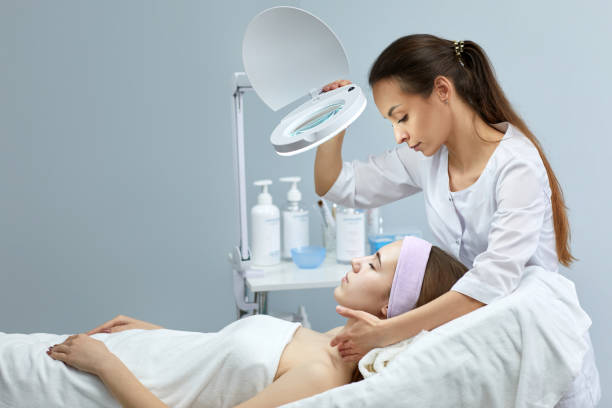It can sometimes seem impossible to manage your skin, especially if you wake up with a large zit on your nose and a small sore in your corner. There are many ways to treat and prevent common skin issues. These are some suggestions.
Acne
Pimples are caused by the pores becoming clogged by a type of oil called Sebum. This oil normally lubricates the hair and skin. Acne occurs during puberty when hormones kick in and cause the skin to produce too much sebum. This area, the T-zone, is the most susceptible to pimples because there are many oil-producing cells on the forehead, nose, and chin.
These are some tips to prevent breakouts from happening and how to get rid of them as quickly as possible.
- Warm water and mild soap are sufficient to wash your face at least twice daily. Use circular motions to massage your face. Don’t scrub. Skin irritation can result from too much washing and scrubbing. After cleansing, the American Academy of Dermatology recommends that you apply a lotion containing benzoyl Peroxide over-the-counter (no need for a prescription) after cleaning.
- Don’t pop pimples. Although it may seem appealing, here are some reasons why you shouldn’t. Popping pimples can cause more inflammation and scarring. A dermatologist can usually treat pimples that occur before big events, such as prom. There is less chance of infection or scarring.
- Avoid touching your face with your fingers or leaning on things that collect skin residue and sebum, like your phone. The bacteria can be spread to your skin by touching it. This can cause irritation and inflammation of the pores. Make sure to wash your hands after applying any treatment creams or makeup to your face in order to keep bacteria away.
- Wearing glasses or sunglasses? Make sure to clean them regularly to prevent oil buildup around your eyes.
- Wearing tight clothing is not a good idea if you have acne. They restrict the skin’s ability to breathe and can irritate the skin. Caps, caps, and headbands can also collect oil and dirt.
- Before you go to bed, take off your makeup. Make sure to look for brands that are “noncomedogenic” or “non-acnegenic.” Don’t throw away makeup that has changed in smell or appearance since you bought it.
- To prevent oil and dirt from clogging pores, keep hair out of your eyes.
- Protect your skin from the sunlight. Although it may appear that a tan can hide acne, it is only temporary. Tans can make your acne worse, not better. Tanning can also cause skin damage that eventually leads to wrinkles.
Talk to a dermatologist if you have concerns about acne. A dermatologist can offer many treatments to help prevent and heal acne scars. A dermatologist will help you choose the best treatment for you. They can also provide valuable tips and tricks for caring for your skin. Many salons and spas employ estheticians who are trained to offer advice and provide skin care treatments.
Sun and skin
All of us know that we must protect our skin from the harmful effects of the sun. It’s not possible to avoid the sun. Who wants to stay inside when it’s so refreshing to be outside? The sun isn’t all bad. It helps our bodies make vitamin D. These tips will help you manage your sun exposure when you are outdoors:
- Even if it is cloudy or you don’t plan to spend a lot of time outside, use sunscreen that has a minimum of 30 sun protection factors (SPF). Even if the sunscreen label says it is waterproof, you should reapply sunscreen if you sweat a lot or swim a lot.
- Make sure you choose a sunscreen that blocks both UVA rays and UVB rays. Look out for words such as “broad spectrum protection” (UVA protection) on sunscreen labels. To keep pores clean, choose a sunscreen labeled “non-acnegenic” and “noncomedogenic.” Spray sunscreen is better than lotion sunscreen because it applies a thicker layer of sunscreen, which protects the skin better.
- Sunlight is strongest between 10 a.m. to 4 p.m., so make sure you apply sunscreen regularly and take frequent breaks indoors. It’s safer to be outside if your shadow is shorter than you are tall. However, sunscreen should still be applied.
- When you are near reflective surfaces such as water, snow, and ice, apply more sunscreen (with a higher SPF).
- Sun damage to the skin is something we all know, but it can also cause eye problems. Sunscreen and sunglasses with 100% UV protection are a great way to protect your eyes and face.
- Prescription acne medications can make you more sensitive to the sun and tanning beds. If you are taking medication, it is important to increase your sun protection.
- You can fake a tan with self-tanners if you desire the look of a natural tan. Avoid tanning beds. They emit the same UV rays that the sun. Even if you use a tanning bed once, you can increase your risk of skin carcinoma.
Cold Sores
Cold sores are usually tender, reddened lips. These sores are usually caused by HSV-1 (a herpes virus that is most commonly not transmitted sexually) and are easily contagious. This virus stays in your body for a long time, so you will likely get cold sores from it.
These are some ways to prevent cold sores (or reappearance, if you have had them before) from appearing.
- You can avoid getting cold sores by not sharing lip balm, toothbrushes, and drinks with people who may have cold sores. Cold sores are transmitted by the virus in the nose (in mucus) and mouth (in saliva).
- Cold sores can be caused by things such as too much sun, stress, or sickness. You don’t need to use suntan lotion. Eat well, get enough sleep, and exercise regularly.
Here are some ways to keep a cold sore at bay.
- If the cold sores are severe, you can take acetaminophen and ibuprofen.
- Ice cubes and ice pops are a great way to relieve pain and keep your cold sores from getting too hot.
- Avoid acidic foods like tomatoes, lemonade, oranges, and lemonade, as they can cause irritation.
- While you wait for cold sores to heal, don’t pick at them. You could spread the disease by picking at them.
Cold sores usually disappear within a few days. If you have cold sores that are persistent or if they become a problem, consult your dermatologist or doctor. They may be able to prescribe medication to reduce symptoms and speed up the healing process.
Eczema
Eczema causes the skin to turn red, itchy, and dry. Eczema can cause itchy rashes, especially around the elbows, knees, neck, and face. Eczema symptoms can vary from one person to another.
Although you cannot cure eczema forever, you can take steps to stop it from getting worse.
- Avoid harsh detergents, perfumed soaps, and heavy-scented lotions, as they can irritate skin and trigger eczema.
- Hot water evaporates quickly, so don’t wash your skin with soap. Instead, take a short, warm bath or shower. Wear gloves if you plan to immerse your hands in hot water (such as when washing dishes or your car). Detergent can dry out and irritate the skin.
- Regular application of a non-fragrance moisturizer will help prevent dryness and itching. Creams moisturize better than lotions and last longer. Creams are most effective when applied after a shower or bath to the skin.
- Pay attention to what fabrics you choose. Cotton is soft and breathable, which makes it a good choice. However, cotton is good for exercising because it’s breathable and soft. Avoid wool and spandex, as they can cause allergic reactions or irritation.
- Stress should be controlled. To reduce stress and avoid eczema flares from arising, do activities such as yoga or walking after a long day.
- Makeup brands should not contain dyes or fragrances that could aggravate eczema.
Talk to a dermatologist if you are having difficulty managing your eczema. They can offer suggestions to help you.
Other skin problems
Warts can be tiny skin infections that are caused by viruses from the human papillomavirus (HPV) family. Other than avoiding contact with others who have warts, there is no way to prevent them. However, if you do have them, you should not pick, scratch, or rub them as you could spread the virus to others and cause new warts.
Warts can be treated with over-the-counter medications containing special acids. However, it is a good idea not to use them unless you have consulted your doctor. Your doctor can help you determine the best treatment for your genital area.
Another type of virus infection similar to warts is Molluscum contagiosum. It’s not as frightening as it sounds! It can be spread by scratching or sexual contact, just like warts.
Most teens experience stretch marks, which are fine lines or purplish on the skin. When tissue beneath your skin pulls or is stretched, such as during puberty, stretch marks can form. They usually disappear on their own after a while. If you are concerned about stretch marks, consult a dermatologist.
It’s more than just looking good. Healthy skin is essential for our survival. Keep your skin healthy and glowing by using the right skin care products and exercising regularly.




